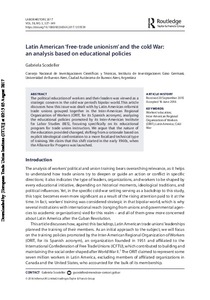Latin American ‘free-trade unionism' and the cold War: an analysis based on educational policies

2017
58
3
July
327-349
history ; trade union ; workers education
Trade unionism
http://dx.doi.org/10.1080/0023656X.2017.1255539
English
Bibliogr.
"The political education of workers and their leaders was viewed as a strategic concern in the cold war period's bipolar world. This article discusses how this issue was dealt with by Latin American reformist trade unions grouped together in the Inter-American Regional Organization of Workers (ORIT, for its Spanish acronym), analyzing the educational policies promoted by its Inter-American Institute for Labor Studies (IIES), focusing specifically on its educational program for trade union instructors. We argue that the nature of the education provided changed, shifting from a rationale based on explicit ideological confrontation to a more focalized technical type of training. We claim that this shift started in the early 1960s, when the Alliance for Progress was launched."
Digital
The ETUI is co-funded by the European Union. Views and opinions expressed are however those of the author(s) only and do not necessarily reflect those of the European Union or the ETUI.